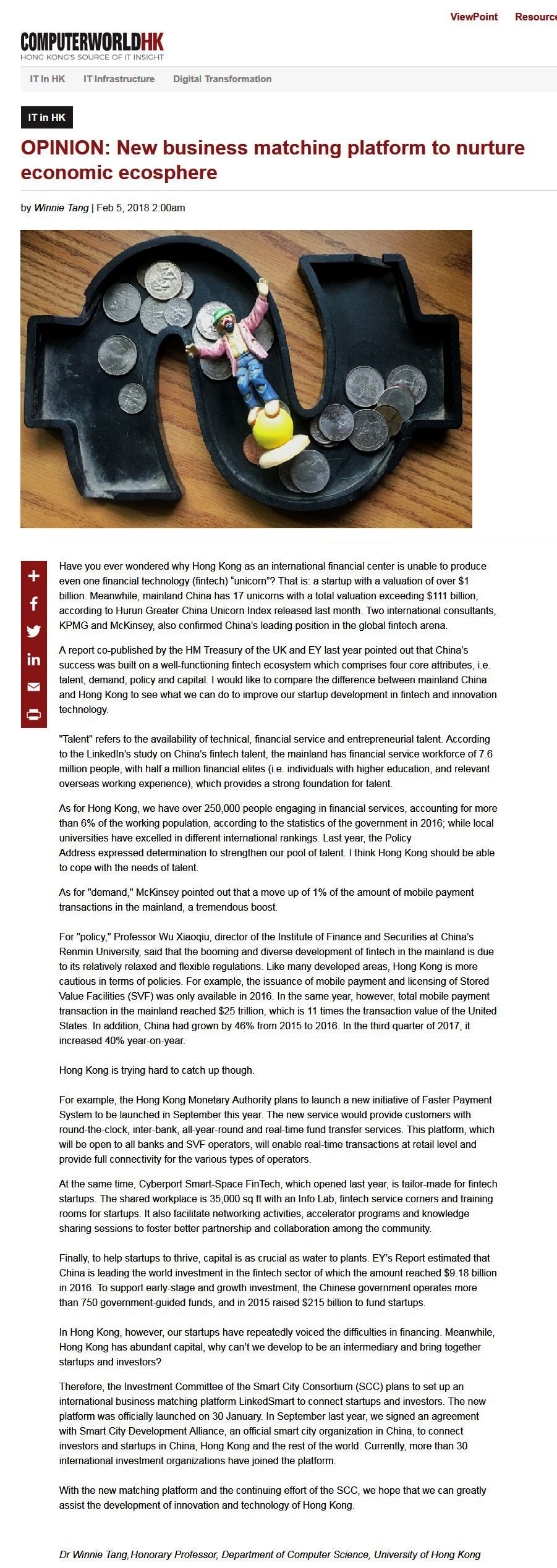網上版請按此

OPINION: New business matching platform to nurture economic ecosphere
Have you ever wondered why Hong Kong as an international financial center is unable to produce even one financial technology (fintech) "unicorn"? That is: a startup with a valuation of over $1 billion. Meanwhile, mainland China has 17 unicorns with a total valuation exceeding $111 billion, according to Hurun Greater China Unicorn Index released last month. Two international consultants, KPMG and McKinsey, also confirmed China's leading position in the global fintech arena.
A report co-published by the HM Treasury of the UK and EY last year pointed out that China's success was built on a well-functioning fintech ecosystem which comprises four core attributes, i.e. talent, demand, policy and capital. I would like to compare the difference between mainland China and Hong Kong to see what we can do to improve our startup development in fintech and innovation technology.
"Talent" refers to the availability of technical, financial service and entrepreneurial talent. According to the LinkedIn's study on China's fintech talent, the mainland has financial service workforce of 7.6 million people, with half a million financial elites (i.e. individuals with higher education, and relevant overseas working experience), which provides a strong foundation for talent.
As for Hong Kong, we have over 250,000 people engaging in financial services, accounting for more than 6% of the working population, according to the statistics of the government in 2016; while local universities have excelled in different international rankings. Last year, the Policy Address expressed determination to strengthen our pool of talent. I think Hong Kong should be able to cope with the needs of talent.
As for "demand," McKinsey pointed out that a move up of 1% of the amount of mobile payment transactions in the mainland, a tremendous boost.
For "policy," Professor Wu Xiaoqiu, director of the Institute of Finance and Securities at China's Renmin University, said that the booming and diverse development of fintech in the mainland is due to its relatively relaxed and flexible regulations. Like many developed areas, Hong Kong is more cautious in terms of policies. For example, the issuance of mobile payment and licensing of Stored Value Facilities (SVF) was only available in 2016. In the same year, however, total mobile payment transaction in the mainland reached $25 trillion, which is 11 times the transaction value of the United States. In addition, China had grown by 46% from 2015 to 2016. In the third quarter of 2017, it increased 40% year-on-year.
Hong Kong is trying hard to catch up though.
For example, the Hong Kong Monetary Authority plans to launch a new initiative of Faster Payment System to be launched in September this year. The new service would provide customers with round-the-clock, inter-bank, all-year-round and real-time fund transfer services. This platform, which will be open to all banks and SVF operators, will enable real-time transactions at retail level and provide full connectivity for the various types of operators.
At the same time, Cyberport Smart-Space FinTech, which opened last year, is tailor-made for fintech startups. The shared workplace is 35,000 sq ft with an Info Lab, fintech service corners and training rooms for startups. It also facilitate networking activities, accelerator programs and knowledge sharing sessions to foster better partnership and collaboration among the community.
Finally, to help startups to thrive, capital is as crucial as water to plants. EY's Report estimated that China is leading the world investment in the fintech sector of which the amount reached $9.18 billion in 2016. To support early-stage and growth investment, the Chinese government operates more than 750 government-guided funds, and in 2015 raised $215 billion to fund startups.
In Hong Kong, however, our startups have repeatedly voiced the difficulties in financing. Meanwhile, Hong Kong has abundant capital, why can't we develop to be an intermediary and bring together startups and investors?
Therefore, the Investment Committee of the Smart City Consortium (SCC) plans to set up an international business matching platform LinkedSmart to connect startups and investors. The new platform was officially launched on 30 January. In September last year, we signed an agreement with Smart City Development Alliance, an official smart city organization in China, to connect investors and startups in China, Hong Kong and the rest of the world. Currently, more than 30 international investment organizations have joined the platform.
With the new matching platform and the continuing effort of the SCC, we hope that we can greatly assist the development of innovation and technology of Hong Kong.
Dr. Winnie Tang
Honorary Professor, Department of Computer Science, The University of Hong Kong